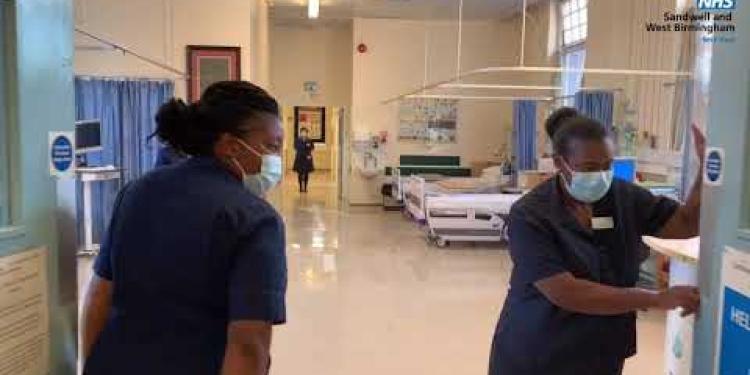Important Information On Using This Service
- Ergsy carefully checks the information in the videos we provide here.
- Videos shown by YouTube after a video has completed have NOT been reviewed by ERGSY.
- To view, click the arrow in the center of the video.
Using Subtitles and Closed Captions
- Most of the videos you find here will have subtitles and/or closed captions available.
- You may need to turn these on and choose your preferred language.
Turn Captions On or Off
- Go to the video you'd like to watch.
- If closed captions (CC) are available, settings will be visible on the bottom right of the video player.
- To turn on captions, click settings.
- To turn off captions, click settings again.
Find A Professional
Sickle Cell Patients Share Their Experiences with NHS Chief Executive Amanda Pritchard
Introduction
Recently, patients suffering from sickle cell disease (SCD) had the opportunity to share their experiences and challenges with NHS Chief Executive Amanda Pritchard. This meeting is part of an ongoing effort by the NHS to better understand the needs and improve the care of individuals living with this chronic condition.
The Significance of Patient Voices
In healthcare, the insights gained from patients are invaluable. For those with SCD, a genetic blood disorder that primarily affects individuals of African and Caribbean descent, expressing their struggles and needs directly to NHS leadership is a major step towards more personalized and effective healthcare solutions.
Challenges Highlighted by Patients
During the meeting, patients described a range of issues they commonly face, including frequent pain crises, delays in receiving appropriate medicines, and the need for better emergency care protocols. Additionally, they emphasized the emotional toll of dealing with a lifelong condition and underscored the importance of support networks and mental health services.
Commitment from the NHS
Amanda Pritchard acknowledged the difficulties faced by SCD patients and reaffirmed the NHS's commitment to improving care. She emphasized the importance of these patient interactions in shaping future policies and thanked the participants for their candor. Pritchard also highlighted ongoing initiatives aimed at reducing health inequalities and improving treatment outcomes for SCD patients.
Looking Forward
The insights gathered from this interaction will inform future NHS strategies and interventions designed to enhance the quality of life for SCD patients across the United Kingdom. This meeting marks a continued effort to place patient needs at the forefront of healthcare planning and implementation.
Conclusion
The dialogue between SCD patients and NHS Chief Executive Amanda Pritchard signifies a vital step in addressing the healthcare challenges faced by the SCD community in the UK. Through sustained collaboration and patient engagement, the NHS aims to foster a more responsive and equitable healthcare system for all.
Frequently Asked Questions
What is sickle cell disease?
Sickle cell disease (SCD) is a group of inherited red blood cell disorders. People with SCD have abnormal hemoglobin in their red blood cells, causing them to form a sickle or crescent shape.
What are the symptoms of sickle cell disease?
Common symptoms include episodes of pain (sickle cell crises), anemia, swelling of the hands and feet, frequent infections, and delayed growth in children.
How is sickle cell disease diagnosed?
SCD is usually diagnosed through a blood test that checks for the presence of sickle-shaped cells and abnormal hemoglobin. In the UK, newborns are routinely screened for SCD.
What treatments are available for sickle cell disease?
Treatments include pain management, hydration, blood transfusions, medications like hydroxyurea, and in some cases, bone marrow or stem cell transplants.
How can sickle cell crises be managed?
Management includes pain relief medications, staying hydrated, avoiding extreme temperatures, and sometimes using blood transfusions.
What is the life expectancy for someone with sickle cell disease?
With advancements in medical care, many people with SCD can live into their 50s or older. However, life expectancy can vary based on the severity of the disease and access to medical care.
How does sickle cell disease affect daily life?
SCD can cause chronic pain and fatigue, impacting daily activities, education, and employment. Regular medical appointments and treatments are essential for managing the disease.
Can sickle cell disease be cured?
Currently, the only potential cure for SCD is a bone marrow or stem cell transplant, which carries significant risks and is not suitable for all patients.
How common is sickle cell disease in the United Kingdom?
SCD is the most common genetic blood disorder in the UK, with around 15,000 people affected. It is more prevalent in people of African or Caribbean descent.
What support is available for sickle cell patients in the UK?
Support includes NHS services, specialist clinics, and organizations like the Sickle Cell Society, which provide resources, advocacy, and community support.
What is the role of the NHS in managing sickle cell disease?
The NHS provides comprehensive care for SCD, including routine screenings, specialist care, emergency treatment for crises, and support services.
Are there any lifestyle changes that can help manage sickle cell disease?
Lifestyle changes such as staying hydrated, eating a balanced diet, avoiding extreme temperatures, and managing stress can help reduce the frequency of sickle cell crises.
What should I do if someone with sickle cell disease is experiencing a crisis?
Ensure they are hydrated and comfortable, provide pain relief if available, and seek immediate medical attention if the pain is severe or other symptoms, such as fever or breathing difficulties, occur.
How are blood transfusions used in the treatment of sickle cell disease?
Blood transfusions can be used to treat severe anemia, prevent stroke, and manage complications. Regular transfusions may be needed for some patients.
What advances are being made in the treatment of sickle cell disease?
Research is ongoing into new treatments such as gene therapy, which aims to correct the genetic defect causing SCD, and new medications to reduce the frequency and severity of pain crises.
Useful Links
Useful links from: Sickle cell anaemia | NHS
- NHS - Sickle cell disease Comprehensive guide by the NHS on sickle cell disease, including symptoms, causes, diagnosis, and treatment options.
- Sickle Cell Society The Sickle Cell Society offers support, advocacy, and information for individuals affected by sickle cell disease and their families.
- NHS Blood and Transplant - Sickle Cell Disease Information from NHS Blood and Transplant about the importance of blood donation for people with sickle cell disease and how to become a donor.
- Sickle Cell and Young Stroke Survivors (SCYSS) Charity dedicated to supporting children and young people with sickle cell disease and those who have experienced strokes.
Useful links from: Introduction to Sickle cell disease
- NHS - Sickle Cell Disease Comprehensive resource on the NHS website covering symptoms, causes, diagnosis, treatment, and living with sickle cell disease.
- Sickle Cell Society UK-based charity providing support, information, and advocacy for individuals affected by sickle cell disease.
- NHS Blood and Transplant - Sickle Cell Disease Information on how to support those with sickle cell disease through blood donation and awareness, provided by NHS Blood and Transplant.
- Sickle Cell and Young Stroke Survivors (SCYSS) Charity supporting children and young people affected by sickle cell disease and young stroke, offering resources and community programs.
Have you found an error, or do you have a link or some information you would like to share? Please let us know using the form below.
- Ergsy carfully checks the information in the videos we provide here.
- Videos shown by Youtube after a video has completed, have NOT been reviewed by ERGSY.
- To view, click the arrow in centre of video.
- Most of the videos you find here will have subtitles and/or closed captions available.
- You may need to turn these on, and choose your preferred language.
- Go to the video you'd like to watch.
- If closed captions (CC) are available, settings will be visible on the bottom right of the video player.
- To turn on Captions, click settings .
- To turn off Captions, click settings again.





